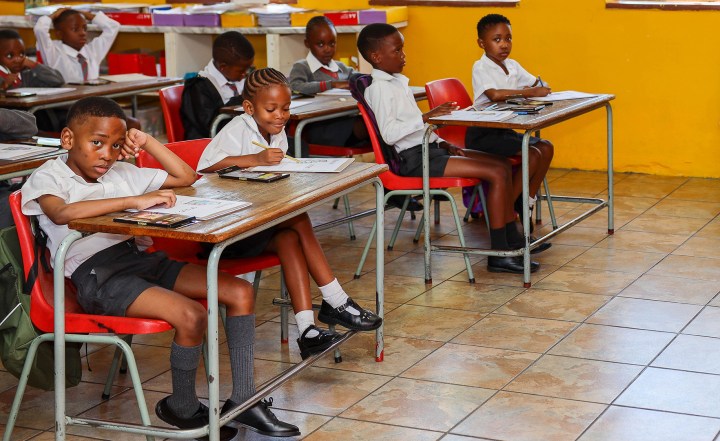LIFE SHEDDING
Rolling blackouts aggravate levels of absenteeism, incomplete homework, disrupted classes in SA

Schools remain largely on their own when it comes to finding solutions to disruptive power outages.
Rolling blackouts have touched all aspects of South African life. Education is no exception. In this sector — still recovering from the disruptions of the Covid-19 pandemic — frequent power outages are impacting teaching and learning, with some school principals even listing them as a factor behind rising absenteeism.
It is not only how rolling blackouts affect children in schools, but also in their homes, that is detrimental to their education, according to *John, principal of a Quintile 3 school in KwaZulu-Natal.
“In our case, we’ve got 2,500 learners and they’re going [home] to an informal settlement… they anticipate their parents getting home at 6pm or maybe 7pm, and that child will now not have a meal because there’s no electricity, there’s nothing being cooked,” he explained.
“We are getting children coming to school that are either hungry or we are getting children coming to school that are not in the right state of mind to learn because… now you’re compounding poverty with a secondary factor.”
With rolling blackouts comes municipal water-shedding, he continued, meaning that while the power is out, no water is being pumped to affected areas.
“If the child is not ready, has not been able to have a wash… that learner is not going to come to school,” said John. “If you measure the learner attendance that you would have had — while hedging between 90% and 100% — now you’re sitting around between 60% and 70% of learners coming to school.”

Mark Fairbairn, principal of Spine Road High School, said that rolling blackouts affected the subject of Information Technology, as well as the use of technology in teaching and learning. (Photo: Tamsin Metelerkamp)
At Luhlaza Secondary School in Khayelitsha, Cape Town, rolling blackouts have caused a rise in lateness among pupils. The power outages wreak “havoc” on traffic in the Khayelitsha area, as traffic lights are affected, according to Mutile Qezo, deputy principal at the school.
“Those that are walking to school… they will leave home later. Because… in the morning, they will have to heat up water, or some of them will have to wait until the power is back and only start washing then, and they get to school late,” he said.
Mark Fairbairn, principal of Spine Road High School in Mitchell’s Plain, Cape Town, told Maverick Citizen that pupils often went home late and needed to complete work at night. With no electricity, that was a challenge.
“Besides all the academic factors, we’re also picking up that a lot of learners are staying absent, so absenteeism has increased, and that might be due to Covid or it might also be due to the electricity not being available,” he said.
“We saw that there’s an increase in learners not doing their homework, staying at home. And the continuation of teaching outside the school is very difficult when we don’t have electricity.”
Learners living in poorer communities often don’t have a home environment conducive to catching up on learning lost during the school day, according to Noncedo Madubedube, general secretary of Equal Education. Generators, UPS systems — even candles, for some — are a luxury their families cannot afford.
“What we think is happening here is a compounding of issues that perpetuate inequalities in our system, because what is really happening is that these learners are being left behind,” said Madubedube.
Situation in schools
Rolling blackouts affect the planning of subjects, with schools having to adjust teaching around outage schedules that frequently change between Stages 2, 4 and 6, according to Nomusa Cembi, media officer for the South African Democratic Teachers Union (Sadtu). Teachers are left with the burden of ensuring the syllabus is covered within reduced hours.
“We’ve instructed our teachers to plan two ways — the old style of planning without using [information and communications technology], and the new style. So, there’s never a time where there’s load shedding and there’s no teaching happening. We plan around the schedule… but it’s quite difficult,” said Fairbairn.
Power outages impact not only the use of ICT in teaching, but also the subject of Information Technology (IT), as it requires access to computers, he added.
“Then also the classrooms are very dark because the natural lighting isn’t sufficient. Our matriculants, they write in the hall. Without electricity, they’re unable to write in the hall and then we need to make alternative arrangements,” he said.
At Luhlaza Secondary School, rolling blackouts bring administration to a grinding halt, according to Qezo.
“Once the power is gone, our secretaries cannot work… they cannot access any reports, they cannot access any information — even information that is coming… from head office,” he said.
Merle Mansfield, programme director at the Zero Dropout Campaign, told Maverick Citizen that rolling blackouts impact security measures such as alarm systems and electric fences.
Visit Daily Maverick’s home page for more news, analysis and investigations
“Particularly in schools that are often vandalised, [this] becomes a huge problem for principals. It’s one of their biggest stresses when there’s no electricity and there’s no alarm system because then schools are more… vulnerable,” she explained.
In schools that provide a nutrition programme for the feeding of pupils, rolling blackouts can impact the preparation and cooking of food, according to Mary Metcalfe, education expert and professor of practice at the University of Johannesburg.
According to John, the nutrition programme at his school relies on gas cooking. However, an electric slicer is used to process the large volumes of ingredients that arrive every second day. Staff have taken to cutting and freezing produce in anticipation of rolling blackouts.
“There’s a lot of things that are very demoralising for learners and teachers who are navigating these under-resourced spaces, and I think when you add an additional thing like not having electricity on top of it, it becomes worse,” said Mansfield.
“It really impacts how people experience school — frustrations are heightened.”
Fairbairn pointed out that as a fee-paying Quintile 5 school, Spine Road High School needs to manage its own finances and pay for electricity.
“We didn’t see a decrease in the bills for our electricity. We pay about R17,000, R18,000 for electricity per month,” he said.
“Our parents come from a disadvantaged community, although we are Quintile 5, and our school fees are R4,000 for the year. So, these electricity bills keep on piling up, but we have long periods without electricity, and I cannot understand that.”
Asked about the impact of rolling blackouts on school costs, John said, “You have to live within your means; you don’t have a choice.”
Seeking a solution
According to Elijah Mhlanga, spokesperson for the Department of Basic Education, rolling blackouts have “very little impact” on schools, as traditional methods of teaching do not require electricity.
“Natural light, green boards and chalk have been the equipment required for teaching and learning. In schools where they depend on power, they have procured generators to deal with the electricity matter,” he said.
When asked if the DBE had plans to better equip schools with alternatives to mitigate the effects of power cuts, he said, “We work around it… there is no heavy dependence on power supply in schools. We have observed this in many schools that we monitor. It is not a major concern.”
However, Madubedube said there was a need to retrofit schools with power alternatives. She advocated for an inter-ministerial response to the crisis brought about by rolling blackouts.
“This isn’t a mineral energy crisis solely,” she said.
Madubedube further called on businesses in South African communities to intervene and assist schools where they could, saying, “School governing bodies at the moment are struggling to make ends meet with the existing budgets… The system itself is not responding urgently to put basic amenities in place for communities in very marginalised places.
“After Covid, we should have learned that education and schooling is everyone’s responsibility. It’s a social responsibility that belongs to people beyond the Department of Basic Education, and so we’re also trying to make a call for businesses in different communities to please consider… checking what provisions folks have in place and supporting schools that don’t have.” DM/MC
*John is a fake name ascribed to a source who chose to remain anonymous out of concern for his job.




















 Become an Insider
Become an Insider
That’s the answer! It doesn’t matter if there is no power, because we can just go back to chalk and talk methods of 40 years ago. Have you tried to engage a class of tech savvy teenagers without technology? It ain’t gonna work!
Add to that the unremitting heat wave in KZN (and I understand that maybe most schools don’t have fans). The learners are little puddles of misery.
I despair!